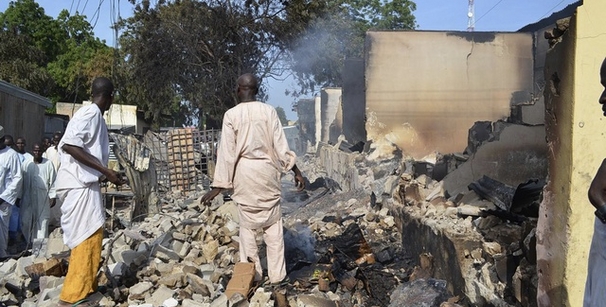
A curious crowd gathered to inspect the bag, which is why there were so many victims when it exploded, said Mr Bukar, who witnessed the blast.
Many wounded people are being treated in the hospital, he said.
“It’s very sad because most of those killed and injured are young men, with a small number of females,” he said.
Nigeria’s homegrown extremists use these kinds of improvised explosive devices in suicide bombings and also to set ablaze homes and buildings of which tens of thousands have been torched.
At least 97 people have been killed in suicide bombings in north-east Nigeria since May 30, and 113 in the past month.
The highest toll from a single bombing was 29 who died in twin suicide bombings on June 4 in the main market at Yola, the capital of north-eastern Adamawa state.
Many of the people carrying bombs are women and children. A bomb disposal expert has told the AP that most suicide bombs are set off remotely, meaning the carrier has no control.
Abbas Gava, a spokesman for the civilian fighters, said yesterday’s deaths were tragic.
“This also further heightens our fears of the need for a lot of sweeping to be done by the explosives ordnance department before people are allowed to go back to their liberated homes,” he said.
Boko Haram took control of a large swath of north-east Nigeria until a multinational force this year forced them out of towns and villages. Nigeria’s military says the extremists are now mostly confined to the Sambisa Forest.
Boko Haram has stepped up bombings and hit-and-run attacks since President Muhammadu Buhari announced at his May 29 inauguration that the command control centre for the war against the insurgents is moving to Maiduguri, the biggest city in north-east Nigeria and the birthplace of Boko Haram.
The UN Children’s Fund reported on May 26 that the number of suicide attacks has jumped to 27 in the first five months of this year compared to 26 for all of last year.
The six-year-old uprising is blamed for the deaths of some 13,000 people. More than 1.5 million have been driven from their homes, some across borders.
FRENCH VERSION


